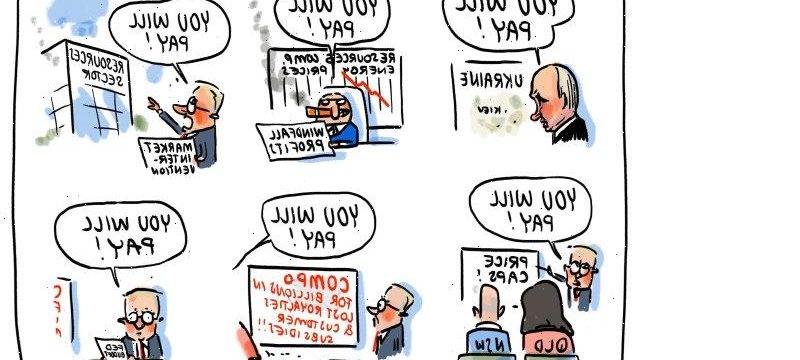Matt GoldingCredit:.
Liberal cul-de-sac
Peter Hartcher’s article on successful ALP female ministers (10/12) reinforces how the Liberal Party has dealt itself out of being a significant player in federal politics, potentially long term. History has not only passed them, but eclipsed them. Peter Dutton fiddles with parochial scenarios around the vulnerability of the impressive Monique Ryan to a Josh Frydenberg resurgence while the likes of Penny Wong take to the world stage with aplomb.
The Liberal Party is in a cul-de-sac of its own making. Its reflexive political point-scoring has sidelined what should be detailed and nuanced policy-making relating to Australia’s future. Its relevance is now seriously in question.
Jon McMillan, Mount Eliza
Limited ambitions
Paul Sakkal’s Q&A with John Pesutto (10/12) made for depressing reading. Pesutto’s ambitions don’t seem to go beyond winning power. Nothing about his ambitions for Victoria, nor for his constituents in Hawthorn. Pesutto should know that he is on notice. Independent candidates are not going away anytime soon.
Margaret Callinan, Hawthorn
Centre of epic fail
Cheers to Kim Lockwood (Letters, 9/12), who asks why “epicentre” rather than “centre”. In fact, “epicentre” means a place that is not at the centre (the prefix, -epi, means “upon”). Epicentre is used in seismology to refer to the place on the surface of the Earth that is above the centre, or focus, of an earthquake, not the centre itself.
If we must have epicentre, why stop there? Given our desperation to hyperventilate our language, how about “ultrasuperepicentre”?
Stephen Carey, Ballarat
Fix the fox first
Such concern about cats (″Council eyes roaming cats″, 7/12). Foxes often invade my suburban yard and house, and attack my cat – and me once – during the day. The council does not want to know. Wildlife organisations do not want to know. Environment agencies do not want know. Controlled cats, such as mine, pose less threat than imported vermin that carry viruses, parasites and smell, and consume native wildlife.
Foxes are cunning and bold. So, will they be asked to observe a 24-hour curfew?
Rosalind McIntosh, Camberwell
Marvellous marble
The Blue Marble, a photograph of the Earth from 29,000 kilometres away, was taken from Apollo 17 50years ago last week. The image shows the Earth cloaked by vast swirling clouds and seas. It shows just one border, one fine line of atmosphere. It’s an image that awakened the realisation that we are suspended in space, sharing air, water, and, ultimately, the fate of our environment.
Fifty years on, the Blue Marble is now somewhat tarnished, and the government’s release of its Nature Positive Plan: better for the environment, better for business, notes “Australia’s environment is not resilient enough to withstand current and emerging threats, and urgent reform is needed″.
This as United Nations Secretary-General Antonio Guterres implored governments and industry to “step up for nature … and pass on a better, greener, bluer and more sustainable world to our children [because] there is no planet B″.
Those in power – politicians and captains of industry – should put that 50-year-old image on their walls, screens and fridge doors to remind them every single day of just what’s at stake.
Karen Campbell, Geelong
The concrete solution …
The solution to this state’s pothole-ridden roads is to go concrete. Concrete roads last far longer than bitumen-asphalt roads.
However, most governments shy from them because they cost more, initially, to build. This is short-sighted or a false economy. Concrete roads wear better and maintenance costs are lower. The problem with maintaining bitumen roads is that all tiers of government resort to cheap ″quick fixes″ which last no time, particularly after heavy rain.
Michael Gamble, Belmont
… The concrete problem
Our money is being poured into massive tonnes of concrete to create huge infrastructure projects. Concrete is very energy intensive – using about 8 per cent of CO2 emissions, and once these projects are completed, they require yet more costs and disruption for maintenance. The ever-growing economy (and population) is supposed to maintain and improve quality of life, but the health system, environment and many social structures are struggling to keep up. We seem to be having uneconomic growth. Like a cancer, it destroys the resources on which lives depend. Surely, our health and wellbeing, and that of our environment, needs to be our priority?
Jennie Epstein, Little River
No one thought
So Scott Morrison would have told everyone about his new portfolios if only someone had bothered to ask. Perhaps no one asked because no one would have imagined that even Morrison was that devious.
Damien Ryan, Berwick
Insanity at work
Every year from Boxing Day, Melburnians pack the car for a holiday west via the West Gate Bridge. And every year, VicRoads chooses the busiest driving day of the year to reduce outgoing lanes down to one for road maintenance.
This ensures traffic chaos with gridlock for tens of kilometres, and can take up to an hour to cross the West Gate and multiple hours to get past Werribee. Every year. This is insanity. VicRoads, change your lane-reduction start date to December 29. It’s not that hard.
Peter Capp, Middle Park
What privacy?
If Harry and Meghan want privacy, they are going about getting it in a very strange way.
Reg Murray, Glen Iris
Silent sites
What is missing in the city? Christmas music.
Kath Linforth, Sandringham
Most Viewed in Politics
From our partners
Source: Read Full Article

